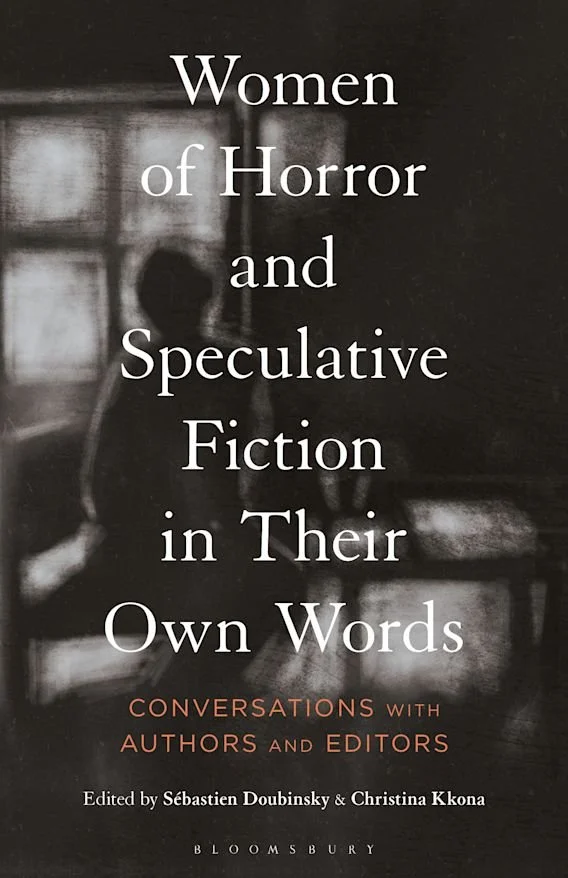Women of Horror and Speculative Fiction In Their Own Words - Conversations with Authors, Editors and Publishers edited by Sebastien Doubinsky and Christina Kkona
I would like to thank the editors for a free copy of this collection in exchange for a fair and honest review
Publisher – Bloomsbury Academic
Published – eBook Out Now Hardback and Paperback 8/2
Price – £19.79 Kindle eBook £80 hardback £21.99 paperback
What makes science fiction genres better than others at challenging social conventions, especially gender? Are speculative works structured differently when addressed to traditionally under-portrayed individuals or communities?
This collection of interviews elicits truly honest and thought-provoking responses that focus on the biographical dimension in speculative fiction, questions of intersectionality, genre (re)definitions and the politicization of fiction. It gives voice to women of different races, nations, classes and sexual orientations who write and edit speculative fiction – such as Ellen Datlow, Kathe Koja, Angela Mi Young Hur, Eugen Bacon, and Cat Rambo. The interviews clarify how the junction of genre and gender is a key element to understanding this literary field, while simultaneously contextualizing and theorizing the interview itself, as a literary genre and a research tool.
The interview is I find a really interesting device when I use it on the blog. It an opportunity to hear the author’s voice, their own thoughts on their novel and their craft. It allows for a flow and honesty that often is quite insightful. Hence, I can see the approach that Sebastien Doubinsky and Christina Kkona have used in their fascinating work – Women of Horror and Speculative Fiction In The Own Words – Conversations with Authors, Editors, And Publishers which creates a fascinating present-day view of the last seventy years of the genre from the perspective of the women in it.
Startin in the Pandemic the editors used the idea of sending their subjects a mix of standard questions and more specific question on the subject’s own work. I loved the variety of voices we get to experience and as we go through the interviews we start to spot similarities and differences. We are not only US/UK focused but get to experience voices across the world and people at various stages of their careers. That plurality I think makes this an important book to assess the ‘standard’ history of the genre and the view as to its approach and health today.
We get to experience the beginning of the modern era via the eyes of very established characters such as Elizabeth Hand, Ann VanderMeer and Ellen Datlow to newer voices such as V Castro or Ai Jiang and more established figures in the UK such as Penny Jones, Priya Sharma or Francesca Barbini. We experience the international viewpoints from Australia via Eugen Bacon and Angela Slatter or JS Breukelaar and Nigeria with Nuzo Onoh.
There is no repeated answer to all. We can see many got into genre via parents or perhaps parent’s willingness for kids to read. One recurring influence is Angela Carter (an author I really need to get to read). We get fascinating thoughts on the usefulness of the term ‘genre’ from those who see it as a marketing tool, a signpost to something to play against. All the opinions expressed are valid, so it is just fascinating to which persuades you as you go along.
How women are treated in the genre is an interesting developing theme. The general view is that it has got better, and it is gratifying that newer voices are saying the community is welcoming but then others note that for those who are trans, disabled or people of colour that the welcoming is often caveated that there are still many willing to they have no right to be here or are omitted. We tend to think the genre is now so much more diverse but this reminds us more still to do. One theme is how having more women on the publishing side of the industry has been helpful. A reminder that its these parts of the genre we need to see more improvement in.
There are some fascinating discussions on who authors tell the stories for and how being a woman has factored into their storytelling. We get thoughts on body horror, dystopias and how the genre had often portrayed women and that portrayal itself has changed over the years. Its thought provoking and as well as hearing from authors I really enjoyed I found it gave me new to me authors I need to look up.
I think while I appreciate the editors are showing each authors voices there are some where the answer is so short or just asking for clarification that they probably could have been edited out without any impact on the wider work.
What though this is an interesting voices focused approach to history that I think takes out the approach of a historian to add commentary and instead the subjects all speak for themselves. It helps to illustrate that progress is not uniform and women’s experiences of the genre are not the same either from the earlier days but even now. It reminds us how much more welcoming the genre is but also that there is still a lot to do. It reminds us that there are a huge amount of talented women in the genre making incredible contributions. Highly recommended!
